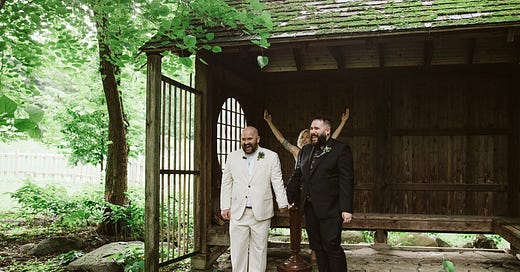i never wanted to get married until suddenly i did.
All it took was a Trump presidency and a global pandemic — kidding, but also.. not.
Queering the Burbs is a weekly-ish distillation of pop culture, politics and queerness. If you like what you see, please consider subscribing (it’s free!!), liking or sharing this essay.
Two weeks and a day ago, I married Stefin, my boyfriend of almost 12 years, in a small, private garden ceremony.
If you had shown me photos of our beautiful day, gazing …
Keep reading with a 7-day free trial
Subscribe to queering the burbs to keep reading this post and get 7 days of free access to the full post archives.



